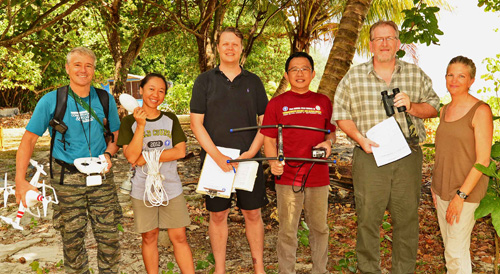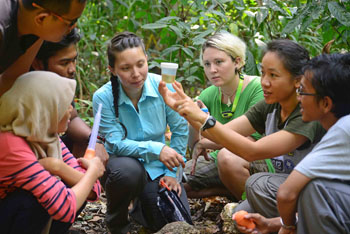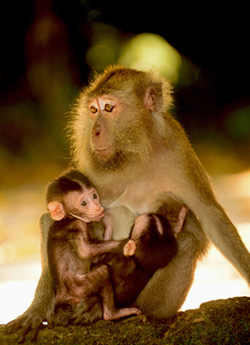25th Annual Field Course on Tinjil Island, INDONESIA
Promoting Conservation Biology, Global Health, and Global Citizens
 This past August 2015, the Primate Research Center (PSSP) at Bogor Agricultural Univ. (IPB) and the Univ. of Washington (UW)
celebrated the 25th anniversary of their collaborative field training program on Tinjil Island. They also celebrated the 20th
anniversary of the associated UW study abroad program established in 1995. Tinjil Island has served as a Natural Habitat
Breeding Facility for long-tailed macaques (Macaca fascicularis) for over 25 years. In 1991, Prof. Randy Kyes and his colleagues
at PSSP-IPB established an annual field course in primatology on Tinjil for students from IPB. The success of this field course
lead to the establishment of a UW study abroad program (International Field Study Program-Indonesia) in 1995 and the opportunity
for students from the U.S. and Indonesia to study together in the field on Tinjil.
This past August 2015, the Primate Research Center (PSSP) at Bogor Agricultural Univ. (IPB) and the Univ. of Washington (UW)
celebrated the 25th anniversary of their collaborative field training program on Tinjil Island. They also celebrated the 20th
anniversary of the associated UW study abroad program established in 1995. Tinjil Island has served as a Natural Habitat
Breeding Facility for long-tailed macaques (Macaca fascicularis) for over 25 years. In 1991, Prof. Randy Kyes and his colleagues
at PSSP-IPB established an annual field course in primatology on Tinjil for students from IPB. The success of this field course
lead to the establishment of a UW study abroad program (International Field Study Program-Indonesia) in 1995 and the opportunity
for students from the U.S. and Indonesia to study together in the field on Tinjil.
 Over the years, the Tinjil field training
has expanded in breath and focus which is reflected in the current title: “Field Course in Conservation Biology & Global
Health: At the Human-Environment Interface.” During the month-long program, students live on the remote island and
participate in lectures, field exercises, and conduct independent research projects. The course concludes with an outreach
program for local school children back on Java.
Over the years, the Tinjil field training
has expanded in breath and focus which is reflected in the current title: “Field Course in Conservation Biology & Global
Health: At the Human-Environment Interface.” During the month-long program, students live on the remote island and
participate in lectures, field exercises, and conduct independent research projects. The course concludes with an outreach
program for local school children back on Java.
To date (Aug., 2015), a total of 327 students have participated in the Tinjil
field course, including 231 from IPB and institutions throughout Indonesia, 82 from the UW/U.S., and 14 from several other
countries including Bangladesh, Denmark, Japan, Mexico, Sweden, Thailand, and UK. Many have gone on to careers in science and
applied fields in conservation and global health.
For many UW/U.S. students, the field training program on Tinjil Island has been described as
“life changing;” examples of this are represented in the following quotes from field course alumni:
My experience in Indonesia was both my first field research
project as well as my first time traveling international. It really
opened up the door for me that lead to many years of research and
travel. One of the most amazing experiences of my life.
Alum’ 97
(This alum attended the field course as a
UW undergrad and went on to receive her Masters in Science at
Central Washington Univ. and
is currently Activity Grant Manager, Water Quality, for the
Washington Department of Ecology)
My experience during the Tinjil field course was my first and
remains my only opportunity to participate in naturalistic
observation research. Previously coming from a basic science
laboratory experience, this experience helped me to ultimately carve
a middle path and pursue a career in translational clinical
research. In addition, this course exposed me to Indonesia, the
Indonesian language and people, animal conservation techniques, the
southern hemisphere, and the amazing natural beauty of Tinjil
Island.
Alum’ 98
(This alum attended the field course as a
UW undergrad and went on to receive her MD at Harvard Medical School
and
is currently an Assistant Professor of Neurology, Harvard Medical
School)
The experience on Tinjil Island was life changing. I went from
hopes of a business degree to pursuing a career in laboratory animal
science. Furthermore, my experiences in Indonesia introduced to me -
and instilled in me - a love of learning other cultures and
traveling around the world.
Alum’ 00
(This alum attended the field course as a
UW undergrad and went on to receive his Masters in Laboratory Animal
Science and
is currently IACUC & IBC Senior Program Coordinator at The
University of Texas, Austin)
The Tinjil Field Course was profoundly influential to me both
personally and professionally. It is a great introduction to
conservation field work, international work, and to Indonesia.
Within a few years of attending the Tinjil field course I found
myself back in Indonesia as a conservation professional. Although
currently living and working stateside, I plan to return to
Indonesia and continue conservation and environmental education
activities there.
Alum’ 02
(This alum attended the field course as a
UW undergrad and went on to receive her Masters in Advanced Studies,
Marine Biodiversity and Conservation, Scripps Institution of
Oceanography, Univ. of California, San Diego and is currently a
College Coordinator at Chincoteague Bay Field Station)
For me the International Field Study Program-Indonesia was truly
life changing. My participation in the program enabled me to take
advantage of multiple opportunities that I had never believed
possible. I thank Professor Kyes for encouraging me to take part in
the IFSP and for inspiring me to continue my academic pursuits far
beyond my initial participation in the program. My participation in
the IFSP almost 7 years ago has been the single most influential
experience in my academic career to date. Professor Kyes’ dedication
and the passion he puts into ensuring the program’s success
translate directly to the IFSP’s positive impact on participants
year after year.
Alum’ 08
(This alum attended the field course as a
young graduate student at UW. She completed her PhD degree in the
School of Environmental and Forest Sciences - conducting her
dissertation research on Tinjil Island)
My involvement with IFSP Indonesia has been the single most life
changing opportunity I have had. It has given me direction for my
future career goals, including a new found love for the Indonesian
people, culture, and language. My involvement with IFSP continues to
facilitate additional educational and community outreach
opportunities, of which all have proved invaluable to my growth as a
future academic professional.
Alum’ 12
(This alum attended the field course as a
UW undergrad and is currently the Patient Care Coordinator at the
Seattle Neuropsychiatric Treatment Center. She plans to pursue a
graduate degree focusing on conservation biology in Indonesia).
I would like to update you in what I've been doing. I applied to
ETCH (education transforming community healthcare) and was accepted!
It's a group of medical, nursing, and undergrads students that
organize healthcare information sessions at homeless shelters around
Seattle. I also applied to health care alternative spring break
where we visit a rural community in Washington and learn about how a
healthcare system is run in a rural setting! Lastly, I applied to
global medical brigades a trip organized by students that results in
a 1 week medical clinic in Nicaragua!!. Your program really inspired
me to do all this. I never realized how much I enjoyed engaging in
activities like this. I appreciate it all very much and hope to go
into global health care later in life!
Alum’ 14
(This alum is currently an undergraduate
student at UW in the Dept. of Biology)

PSSP-IPB and UW are proud to celebrate 25 years of field training on
Tinjil Island and believe this program represents an excellent model
of international collaboration.
Key colleagues in this training program include: Dr. Entang
Iskandar, Dr. Pensri Kyes, Prof. Dondin Sajuthi, and Dr. Joko
Pamungkas. Supporting instructors in the 2015 field course included
Dr. Matthew Novak, Dr. Kimberley Phillips, Justin McNulty, MS, Dr.
Anom Bowolaksono, and Dr. Wichitra Singhirunnusom.
Supported in part by: PSSP-IPB; IPB International Office; Washington
National Primate Research Center, UW; One Earth Institute;
US-Indonesia Partnership Program; South East Asia Center of the
Henry M. Jackson School of International Studies, UW; American
Institute for Indonesian Studies; ORIP-NIH Grant No. P51OD010425 to
WaNPRC.

